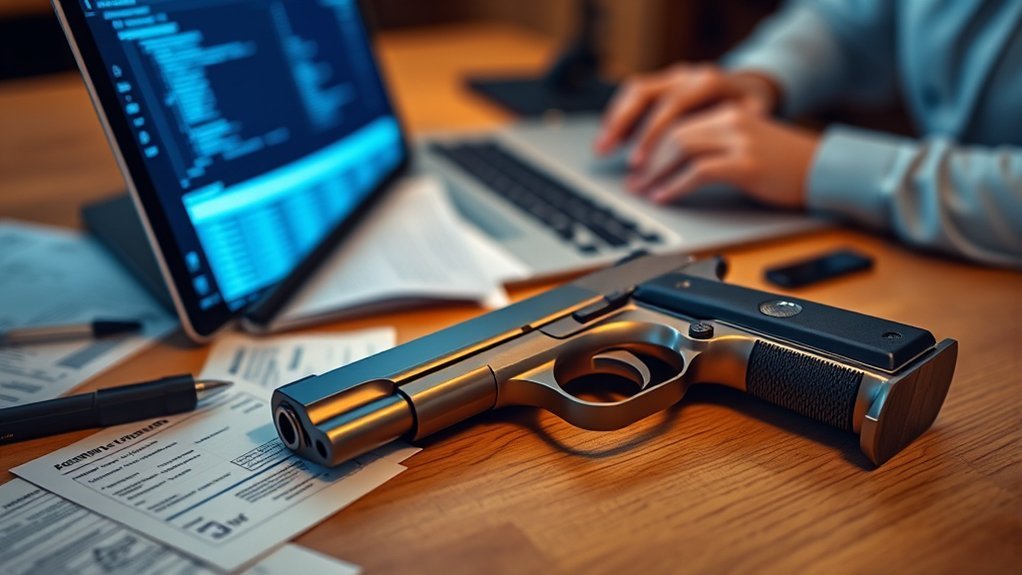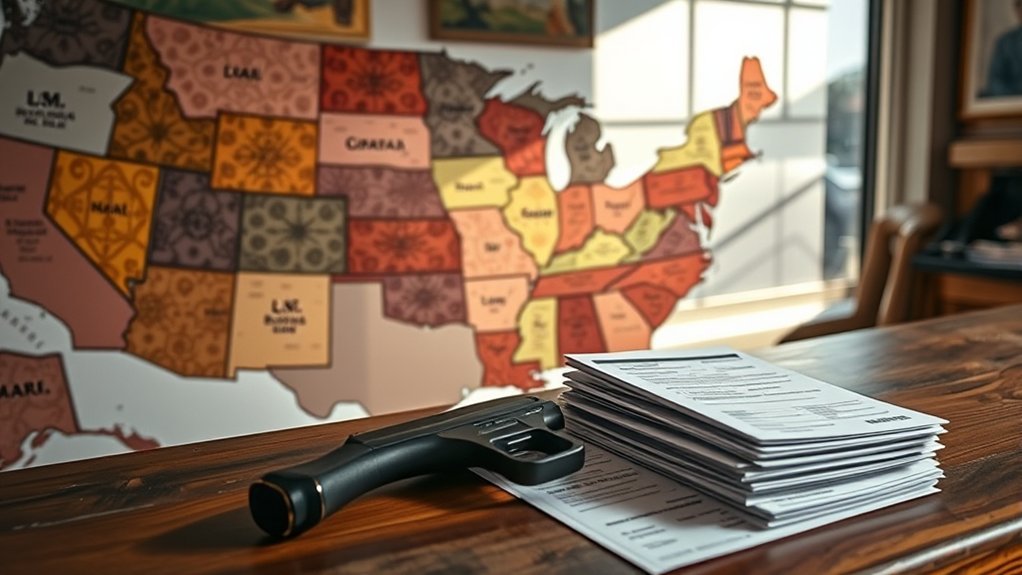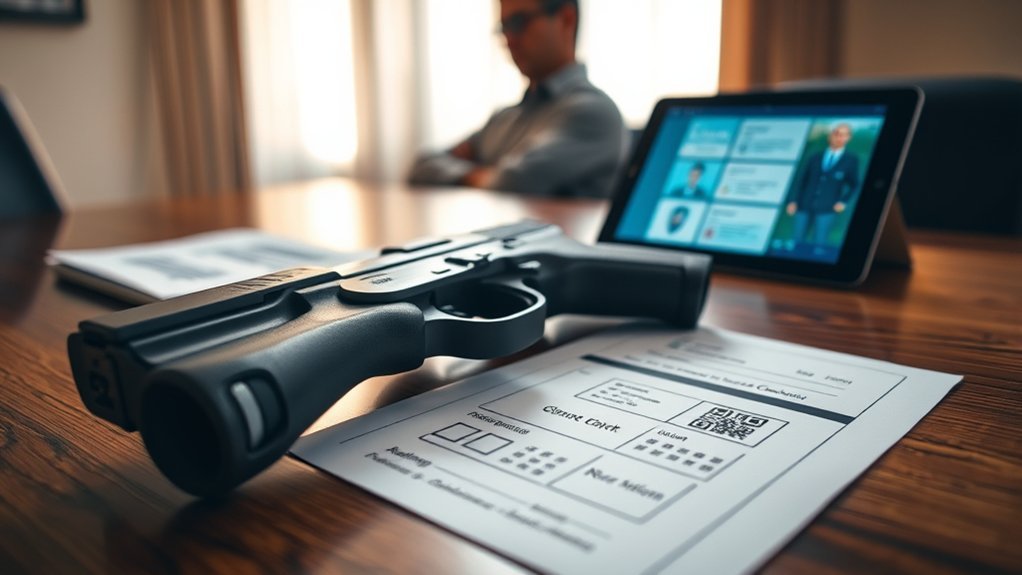When you consider firearm background checks, it’s essential to understand how the process operates and the various factors that influence it. From key databases to state-specific requirements, the landscape is complex. There’s also the issue of default proceeds and the implications for prohibited purchasers. To grasp the full picture, it’s vital to explore these elements and their impact on gun control laws. What might surprise you is the extent of these gaps and their consequences.
Overview of the Background Check Process
When you’re looking to purchase a firearm, the background check process starts with you completing ATF Form 4473, which provides essential information to the gun store. After you submit this form, the federally licensed firearm dealer contacts the National Instant Criminal Background Check System (NICS) to verify your eligibility. Since its inception in 1998, NICS has processed over 320 million checks, with 98% cleared within minutes. The FBI examines criminal records, mental health histories, military discharges, and immigration statuses. This scrutiny has led to over 3 million sales being denied, primarily due to felony convictions. If a check isn’t resolved in three business days, the sale may proceed under the “default proceed” rule, raising concerns for public safety.
Key Databases Used in Background Checks

When you consider firearm background checks, understanding the key databases involved is essential. The NICS, along with the Interstate Identification Index and the NCIC, plays a significant role in identifying individuals who may be prohibited from gun ownership. However, variability in state reporting and privacy law challenges can create gaps that undermine the effectiveness of these databases.
NICS Overview and Function
Understanding the National Instant Criminal Background Check System (NICS) is essential for grasping how firearm purchases are monitored in the United States. Operated by the FBI, NICS processes background checks for individuals seeking to buy firearms from federally licensed dealers. It relies on three key databases: the Interstate Identification Index for criminal convictions, the National Crime Information Center (NCIC) for protective orders, and the NICS Indices, which flag individuals prohibited from gun ownership. Since 1998, NICS has conducted over 320 million checks, with 98% cleared within minutes. However, challenges like incomplete state records and privacy laws regarding mental health data can hinder its effectiveness. Significantly, felony convictions account for the majority of background check denials.
State Reporting Variability
Variability in how states report to the key databases used for firearm background checks greatly impacts the effectiveness of the NICS. This inconsistency can lead to significant challenges, allowing prohibited purchasers to escape detection. Here are some key factors affecting state reporting variability:
- Incomplete records, resulting in failure to identify individuals unlawfully obtaining firearms
- Underreporting of mental health records due to privacy laws
- Inconsistent submission of military records to background check databases
- Notable cases illustrating severe consequences of reporting failures
These issues create gaps in the background check system, ultimately hindering the identification of individuals who should be restricted from gun ownership. Addressing state reporting variability is essential for improving the overall reliability of firearm background checks.
Privacy Law Challenges
Privacy laws play an essential role in shaping the effectiveness of key databases used in firearm background checks. These laws often limit access to critical information, particularly mental health records, leading to gaps in the background check system. Incomplete data can allow individuals who should be prohibited from gun ownership to acquire firearms. Additionally, state variability in reporting and underreporting of military records further complicate the issue, highlighting the need for improved practices.
| Database | Data Type | Reporting Issues |
|---|---|---|
| Interstate Identification Index | Criminal Convictions | Inconsistent state reporting |
| National Crime Information Center | Protective Orders | Limited access to information |
| NICS Indices | Prohibited Individuals | Underreported mental health records |
| Military Records | Service History | Incomplete submissions |
| State Reporting Variability | Overall Data Quality | Discrepancies in reporting |
State Variability in Background Check Requirements

When it comes to firearm background checks, states vary considerably in their regulations and requirements. You might find that some states impose additional checks beyond federal standards, while others rely solely on national databases like NICS. Additionally, the timeframe for completing these checks can differ, with some states enforcing longer waiting periods than what federal law dictates.
State-Specific Regulations
While federal law sets a baseline for firearm background checks, states have the authority to impose their own regulations, resulting in a patchwork of requirements across the country. Understanding these state-specific regulations is essential for anyone involved in firearm sales.
- 21 states conduct additional background checks beyond federal requirements.
- States like California and New York require checks for all sales, including private transactions.
- Variability in waiting periods exists, with California enforcing a 30-day wait, while others may allow sales after just three days.
- 28 states issue permits that exempt holders from federal background checks, raising concerns about buyer screening.
These differences can greatly impact the effectiveness of background checks and overall firearm sales safety.
Additional State Requirements
As states exercise their authority to impose additional background check requirements, you’ll notice considerable variability in regulations across the country. Currently, 21 states and D.C. conduct their own background checks, enhancing the federal National Instant Criminal Background Check System (NICS). For example, California and New York mandate background checks for all firearm sales, including private transactions, while states like Florida and Alabama lack such requirements. Some states have also addressed specific loopholes, such as the “boyfriend loophole,” which allows certain abusers to acquire firearms unchecked. Research shows that states with universal background checks experience a 10% reduction in firearm homicide rates, highlighting the effectiveness of these additional measures in promoting public safety.
Timeframe Variability
State-specific variations in background check requirements greatly influence the timeframe for firearm purchases. While federal law sets a three-day default for background checks, many states impose additional regulations that can extend this period considerably.
- California mandates a 30-day waiting period for checks.
- Florida and Colorado allow indefinite waits until checks clear.
- About 10% of checks require further investigation beyond three days.
- Discrepancies in state laws often complicate the reporting and processing of background checks.
These variations highlight the complexities involved in firearm eligibility determinations, where the final decision can vary based on state regulations. Understanding these factors is essential for steering through the often unpredictable timeframe surrounding firearm purchases.
Duration of Background Checks and Default Proceeds
The duration of firearm background checks plays a vital role in maintaining public safety, especially considering the default proceed rule that allows sales to continue if a check remains unresolved after three business days. While the National Instant Criminal Background Check System (NICS) aims for a 90% immediate decision rate, around 10% of checks require further investigation, often involving individuals prohibited from obtaining firearms due to issues like domestic violence. If those checks aren’t resolved in time, the potential risks increase significantly. For example, the Charleston loophole highlighted the dangers of allowing transactions to proceed without complete verification, emphasizing the importance of timely and thorough background checks to ensure that firearms do not fall into the wrong hands.
Consequences of Default Proceed Transactions
False. Default proceed transactions can pose significant risks to public safety. When firearm sales are allowed to proceed after three business days without a completed background check, the consequences can be dire. Here are some key points to reflect upon:
- About 10% of background checks require further investigation, often involving prohibited individuals.
- The 2015 Charleston church shooting highlights the dangers of these transactions.
- In 2000, around 5,000 retrieval orders were issued for firearms sold under default proceed conditions.
- Default proceed sales are linked to increased risks of gun violence, especially in domestic violence cases.
These statistics illustrate the urgent need to reassess default proceed policies to enhance public safety and reduce potential gun violence incidents.
Prohibited Purchasers and Retrieval Orders
Default proceed transactions can lead to firearms ending up in the hands of individuals who are legally prohibited from purchasing them. Those prohibited from owning firearms often include convicted felons, individuals under restraining orders, and those deemed mentally ill by a court. If a buyer is found to be prohibited after a sale, the FBI can issue retrieval orders to recover the firearm. In 2000, about 5,000 retrieval orders followed over 45,000 default proceed transactions, highlighting enforcement challenges. The Bureau of Alcohol, Tobacco, Firearms and Explosives (ATF) executes these orders, but they remain relatively uncommon. These cases emphasize the need for accurate reporting to the National Instant Criminal Background Check System (NICS) to prevent firearms from reaching prohibited individuals.
Gaps in Current Gun Control Laws
While background checks are essential for preventing firearms from falling into the wrong hands, significant gaps in current gun control laws undermine their effectiveness. These loopholes facilitate dangerous situations, allowing individuals who shouldn’t have access to firearms to obtain them easily. Key issues include:
- Approximately 20% of gun sales occur without background checks due to private seller loopholes.
- The “default proceed” rule permits sales to go through after three days, risking sales to prohibited individuals.
- The “boyfriend loophole” enables those convicted of domestic violence misdemeanors to purchase firearms.
- Federal law fails to mandate background checks for unlicensed private sellers, with 22% of Americans acquiring guns without checks in the past two years.
Addressing these gaps is vital for enhancing gun control measures.
Importance of Comprehensive Reporting
The effectiveness of firearm background checks hinges greatly on thorough reporting to the National Instant Criminal Background Check System (NICS). States vary notably in how they submit criminal and mental health records, which can create gaps that allow ineligible individuals to unlawfully acquire firearms. The FBI relies on three primary databases for these checks, but incomplete state records complicate accurate eligibility assessments. Privacy laws often limit the reporting of mental health records, leading to fewer than 43,000 mental health-related denials since 1998. High-profile incidents like the Charleston church shooting demonstrate the severe consequences of inadequate reporting. To close legal loopholes, we need enhanced data collection and detailed reporting to guarantee individuals with felony convictions, domestic violence issues, and mental health concerns are appropriately flagged.
Supporting Journalism on Gun Violence
Supporting journalism on gun violence is essential for illuminating the often-overlooked realities of its impact on communities and informing necessary policy changes. Investigative reporting sheds light on flaws in the background check system, revealing gaps that allow prohibited individuals to access firearms. By supporting these efforts, you can contribute to a more informed public discourse on gun safety.
- Raises awareness about the consequences of gun violence
- Highlights survivor stories to motivate public support
- Advocates for informed policy changes and stronger background checks
- Fosters accountability among elected officials
Donations and memberships to organizations focused on gun violence reporting enhance research and community engagement, ultimately promoting effective solutions to this pressing issue.
Conclusion
So, while you might think a quick background check is all it takes to keep guns out of the wrong hands, the reality’s a bit murkier. With state-to-state variations, default proceeds, and gaps in reporting, it’s like a game of hide-and-seek—except the stakes are life and death. We can’t ignore these flaws if we want real change. So, let’s keep pushing for thorough reforms, because, after all, who doesn’t want a little more safety in the mix?

